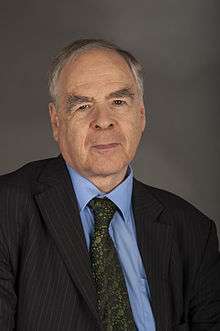György Schöpflin
| György Schöpflin | |
|---|---|
 | |
| Member of the European Parliament for Hungary | |
|
Assumed office 2004 | |
| Personal details | |
| Born |
24 November 1939 Budapest, Hungary |
| Political party | Fidesz |
| Children | 3 |
| Alma mater |
University of Glasgow College of Europe |
| Profession | Academic |
György Schöpflin (also known as George Schöpflin) (born 24 November 1939) is a Hungarian academic and politician. He is a Member of the European Parliament for Fidesz and the European People's Party, and sits on the European Parliament's Committee on Foreign Affairs. Schöpflin is a substitute member of the Committee on Constitutional Affairs, and a member of the Reconciliation of European Histories Group.[1]
Formerly Jean Monnet Professor of Politics at the School of Slavonic and East European Studies, University College London, he has published extensively on questions of nationhood, identity and political power.
Career
Schöpflin lived in the UK from 1950 to 2004, gaining his secondary education certificate in Scotland, followed by an MA in 1960 and an LLB in 1962 at the University of Glasgow, and a Certificate of Advanced European Studies from the College of Europe, Bruges, in 1963.[2] He then worked at the Royal Institute of International Affairs in London from 1963–67, followed by a spell at the BBC until 1976.[2] He then returned to academia at the School of Slavonic and East European Studies, University of London, becoming Jean Monnet Professor of Politics in 1998.[2] In 2004, he was elected a Member of the European Parliament. He is currently also teaching at the Forlì Branch of the University of Bologna.
He was reelected to the European Parliament in 2009 and serves as a full member on the Foreign Affairs Committee (AFET) and as substitute on the Committee on Constitutional Affairs (AFCO).
In March 2010, he was awarded a doctorate honoris causa by the University of Tallinn.
In October 2013, he was awarded a doctorate honoris causa by Corvinus University, Budapest.
Publications
Schöpflin has published academic works in both English and Hungarian. When writing in English, he is known as George; in his Hungarian publications he is György.
- The Hungarians of Rumania (Minority Rights Group, London, 1978).
- Politics in Eastern Europe 1945-1992 (Blackwell, 1993)
- Nations, Identity, Power (Hurst, 2000)
- Myths and Nationhood (Hurst, 1997, co-edited with Geoffrey Hosking)
- State Building in the Balkans: Dilemmas on the Eve of the 21st Century (Longo, 1998, co-edited with Stefano Bianchini)
- Az identitás dilemmái (Attraktor, 2004).
- "The Dilemmas of Identity" (Tallinn University Press, 2010).
- "Politics, Illusions, Fallacies" (Tallinn University Press, 2012).
See also
References
- ↑ "About Us – Reconciliation of European Histories Group". Reconciliation of European Histories Group. Retrieved 1 August 2011.
- 1 2 3 "Biography". György Schöpflin. Retrieved 2008-05-11.
External links
- Personal homepage
- Personal profile of György Schöpflin in the European Parliament's database of members
- Declaration (PDF) of financial interests (Hungarian)
- Interview on democracy in Europe